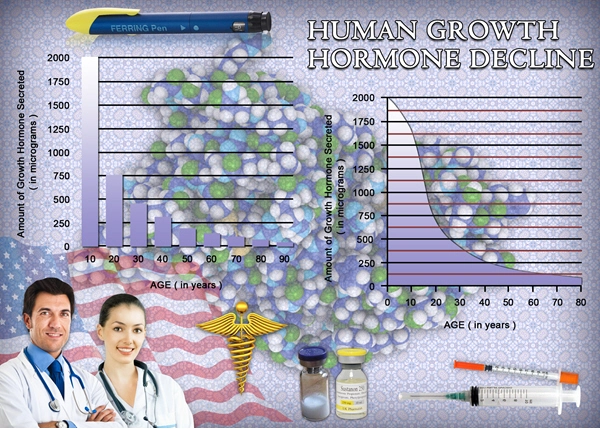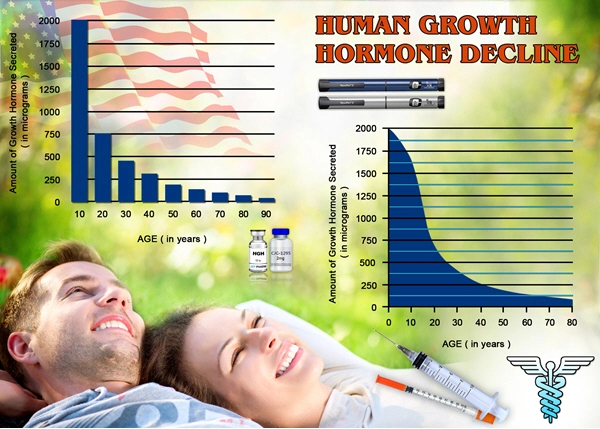Introduction to Endocrine Disorders and Heart Disease
Endocrine disorders, which involve imbalances in hormone levels, can significantly impact the health of American men, particularly those with pre-existing heart disease. The intricate relationship between the endocrine system and cardiovascular health necessitates a focused approach to manage these conditions effectively. This article delves into the management of common endocrine disorders in men with heart disease, emphasizing strategies to improve overall health outcomes.
Prevalence and Impact of Endocrine Disorders in Men with Heart Disease
In the United States, a significant number of men suffer from both endocrine disorders and heart disease. Conditions such as diabetes, hypothyroidism, and testosterone deficiency are prevalent and can exacerbate cardiovascular risks. For instance, diabetes can lead to accelerated atherosclerosis, increasing the likelihood of heart attacks and strokes. Similarly, low testosterone levels have been linked to increased visceral fat, a risk factor for heart disease. Understanding the prevalence and impact of these disorders is crucial for effective management.
Diabetes Management in Men with Heart Disease
Diabetes is a critical endocrine disorder that requires meticulous management in men with heart disease. Glycemic control is paramount, as poor management can lead to further cardiovascular complications. American men should aim for an HbA1c level below 7%, as recommended by the American Diabetes Association. This can be achieved through a combination of lifestyle modifications, such as a balanced diet and regular exercise, and pharmacological interventions like metformin or insulin therapy. Regular monitoring and adjustments to treatment plans are essential to prevent diabetic complications that could worsen heart disease.
Hypothyroidism and Cardiovascular Health
Hypothyroidism, characterized by an underactive thyroid gland, can contribute to cardiovascular issues such as bradycardia and increased cholesterol levels. For American men with heart disease, managing hypothyroidism involves regular thyroid function tests and appropriate hormone replacement therapy with levothyroxine. It is crucial to titrate the dose carefully to avoid overtreatment, which can strain the heart. Collaboration between endocrinologists and cardiologists is vital to tailor treatment plans that address both conditions effectively.
Testosterone Deficiency and Heart Disease
Testosterone deficiency, or hypogonadism, is another endocrine disorder that can affect men with heart disease. Low testosterone levels are associated with increased cardiovascular risk factors, including obesity and metabolic syndrome. For American men, testosterone replacement therapy (TRT) may be considered, but it must be approached with caution. Recent studies have raised concerns about the potential cardiovascular risks of TRT, necessitating a thorough evaluation of benefits versus risks. Lifestyle interventions to improve overall health, such as weight management and exercise, should be prioritized alongside any hormonal treatments.
Integrated Care Approach
Managing endocrine disorders in men with heart disease requires an integrated care approach. This involves close collaboration between endocrinologists, cardiologists, and primary care physicians to develop comprehensive treatment plans. Regular follow-ups and adjustments to medications and lifestyle recommendations are essential to monitor progress and address any emerging issues. Patient education plays a crucial role in empowering American men to take an active role in managing their health, ensuring adherence to treatment regimens and lifestyle changes.
Conclusion
The management of endocrine disorders in American men with heart disease is a complex but crucial aspect of healthcare. By addressing conditions such as diabetes, hypothyroidism, and testosterone deficiency through a multidisciplinary approach, healthcare providers can significantly improve the quality of life and cardiovascular outcomes for their patients. Emphasizing patient education and regular monitoring will ensure that these men receive the best possible care tailored to their unique health needs.

- Endocrinology and Sleep: Impact on American Men's Health and Disorders [Last Updated On: March 7th, 2025] [Originally Added On: March 7th, 2025]
- PCOS Challenges and Management in Transgender American Men [Last Updated On: March 17th, 2025] [Originally Added On: March 17th, 2025]
- Dietary Strategies for Optimal Endocrine Health in American Males [Last Updated On: March 18th, 2025] [Originally Added On: March 18th, 2025]
- Vitamin D's Crucial Role in Endocrine Health for American Males [Last Updated On: March 18th, 2025] [Originally Added On: March 18th, 2025]
- Hormonal Shifts in Aging American Men: Endocrinology Insights and Management Strategies [Last Updated On: March 19th, 2025] [Originally Added On: March 19th, 2025]
- Endocrine Health and Cancer Risk in American Men: Hormones, Disruptors, and Prevention Strategies [Last Updated On: March 19th, 2025] [Originally Added On: March 19th, 2025]
- Endocrinology's Impact on Male Sexual Health: Hormones, Disorders, and Holistic Treatment [Last Updated On: March 20th, 2025] [Originally Added On: March 20th, 2025]
- Autoimmune Endocrine Disorders in American Males: Symptoms, Diagnosis, and Treatment Strategies [Last Updated On: March 20th, 2025] [Originally Added On: March 20th, 2025]
- Managing Endocrine Disorders and Type 2 Diabetes in American Men: Strategies and Insights [Last Updated On: March 21st, 2025] [Originally Added On: March 21st, 2025]
- Hormonal Optimization for American Male Athletes: Enhancing Performance Safely [Last Updated On: March 21st, 2025] [Originally Added On: March 21st, 2025]
- Male Infertility and Endocrinology: Hormonal Insights and American Men's Health Strategies [Last Updated On: March 21st, 2025] [Originally Added On: March 21st, 2025]
- Lifestyle Choices Impacting Endocrine Health in American Men: Diet, Exercise, and More [Last Updated On: March 21st, 2025] [Originally Added On: March 21st, 2025]
- Endocrinology's Role in Weight Management for American Males: Hormonal Strategies [Last Updated On: March 21st, 2025] [Originally Added On: March 21st, 2025]
- Chronic Fatigue in Men: Endocrinology's Role and Treatment Strategies [Last Updated On: March 21st, 2025] [Originally Added On: March 21st, 2025]
- Endocrine Disruptors: Impact on American Males' Health and Mitigation Strategies [Last Updated On: March 22nd, 2025] [Originally Added On: March 22nd, 2025]
- Endocrine Health and Prostate Cancer: Insights for American Men [Last Updated On: March 23rd, 2025] [Originally Added On: March 23rd, 2025]
- Hormonal Influences on Men's Skin Health: Testosterone, Estrogen, and Cortisol Effects [Last Updated On: March 23rd, 2025] [Originally Added On: March 23rd, 2025]
- Endocrine Disorders and Autoimmune Diseases in American Men: Challenges and Management [Last Updated On: March 23rd, 2025] [Originally Added On: March 23rd, 2025]
- Endocrine Health and Liver Function: Vital for American Males' Well-being [Last Updated On: March 23rd, 2025] [Originally Added On: March 23rd, 2025]
- Endocrinology and Kidney Health: Critical Insights for American Men's Well-being [Last Updated On: March 24th, 2025] [Originally Added On: March 24th, 2025]
- Endocrinology's Impact on Joint Health in American Men: Hormones and Mobility [Last Updated On: March 24th, 2025] [Originally Added On: March 24th, 2025]
- Gout in American Males: Endocrine Influences and Multidisciplinary Management Strategies [Last Updated On: March 24th, 2025] [Originally Added On: March 24th, 2025]
- Endocrine Health and Vision: Impacts on American Males [Last Updated On: March 24th, 2025] [Originally Added On: March 24th, 2025]
- Endocrine Health and Mental Well-being in American Males: A Comprehensive Overview [Last Updated On: March 24th, 2025] [Originally Added On: March 24th, 2025]
- Endocrine Health Impacts Respiratory Function in American Males: Insights and Management [Last Updated On: March 24th, 2025] [Originally Added On: March 24th, 2025]
- Endocrine Health's Impact on Hearing in American Males: Prevention and Management [Last Updated On: March 24th, 2025] [Originally Added On: March 24th, 2025]
- Alcohol's Impact on Endocrine Function and Health in American Males [Last Updated On: March 24th, 2025] [Originally Added On: March 24th, 2025]
- Hormonal Influences on Muscle Health in American Males: Testosterone, GH, IGF-1, Cortisol [Last Updated On: March 24th, 2025] [Originally Added On: March 24th, 2025]
- Exploring Endocrinology's Role in Treating ADHD in American Males [Last Updated On: March 25th, 2025] [Originally Added On: March 25th, 2025]
- Smoking's Impact on Endocrine Health in American Men: Risks and Cessation Strategies [Last Updated On: March 25th, 2025] [Originally Added On: March 25th, 2025]
- Endocrinology's Crucial Role in Treating Male Eating Disorders in the U.S. [Last Updated On: March 25th, 2025] [Originally Added On: March 25th, 2025]
- Hormonal Imbalances and Novel Endocrinological Treatments for Male Anxiety [Last Updated On: March 25th, 2025] [Originally Added On: March 25th, 2025]
- Hormonal Impacts on Hair Health in American Men: Androgens, Lifestyle, and Treatments [Last Updated On: March 25th, 2025] [Originally Added On: March 25th, 2025]
- Exploring the Impact of Hormonal Imbalances on Male Depression in the USA [Last Updated On: March 25th, 2025] [Originally Added On: March 25th, 2025]
- Sleep's Crucial Role in Endocrine Health for American Males [Last Updated On: March 26th, 2025] [Originally Added On: March 26th, 2025]
- Managing Endocrine Disorders in American Men with Neurological Conditions: Strategies and Insights [Last Updated On: March 26th, 2025] [Originally Added On: March 26th, 2025]
- Stress Impact on Male Endocrinology: HPA Axis, Hormones, and Management Strategies [Last Updated On: March 26th, 2025] [Originally Added On: March 26th, 2025]
- Endocrine Disorders in Men: Impact on Eye Health and Management Strategies [Last Updated On: March 26th, 2025] [Originally Added On: March 26th, 2025]
- Hormonal Influences on Men's Oral Health: Insights and Management Strategies [Last Updated On: March 27th, 2025] [Originally Added On: March 27th, 2025]
- Endocrine Disorders in American Men: Impact on Skin Health and Management Strategies [Last Updated On: March 27th, 2025] [Originally Added On: March 27th, 2025]
- PTSD in American Males: Exploring Endocrinological Interventions and Treatment Integration [Last Updated On: March 27th, 2025] [Originally Added On: March 27th, 2025]
- Endocrine-Gastrointestinal Interplay: Management Strategies for American Men [Last Updated On: March 28th, 2025] [Originally Added On: March 28th, 2025]
- Hormonal Imbalances and Foot Health: A Guide for American Men [Last Updated On: March 28th, 2025] [Originally Added On: March 28th, 2025]
- Hormonal Imbalances and Innovative Endocrinological Treatments for Male Insomnia in the USA [Last Updated On: March 28th, 2025] [Originally Added On: March 28th, 2025]
- Exercise Impact on Endocrine System in American Males: Hormonal Changes and Health Benefits [Last Updated On: March 28th, 2025] [Originally Added On: March 28th, 2025]
- Endocrine-Digestive Health Link: Hormones, Diet, and Exercise for American Males [Last Updated On: March 28th, 2025] [Originally Added On: March 28th, 2025]
- Hormonal Balance and Immune Health in American Men: A Comprehensive Guide [Last Updated On: March 28th, 2025] [Originally Added On: March 28th, 2025]
- Endocrine Health Impacts on Nail Conditions in American Males: Insights and Management [Last Updated On: March 29th, 2025] [Originally Added On: March 29th, 2025]
- Nutrition's Impact on Endocrine Health in American Males: Macronutrients, Micronutrients, and Diets [Last Updated On: March 29th, 2025] [Originally Added On: March 29th, 2025]
- Caffeine's Impact on Endocrine Function in American Males: Benefits and Risks [Last Updated On: March 30th, 2025] [Originally Added On: March 30th, 2025]
- Endocrinology's Role in Enhancing Bipolar Disorder Treatment for American Males [Last Updated On: March 30th, 2025] [Originally Added On: March 30th, 2025]
- Endocrine Disorders and Ear Health in American Men: A Holistic Management Approach [Last Updated On: April 1st, 2025] [Originally Added On: April 1st, 2025]
- Hormonal Impacts on Nasal Health in American Men: Insights and Management [Last Updated On: April 3rd, 2025] [Originally Added On: April 3rd, 2025]
- Hydration's Vital Role in Endocrine Health for American Males: A Comprehensive Overview [Last Updated On: April 3rd, 2025] [Originally Added On: April 3rd, 2025]
- Endocrine Health's Impact on Hand Health in American Males: A Comprehensive Analysis [Last Updated On: April 3rd, 2025] [Originally Added On: April 3rd, 2025]
- Endocrine System's Impact on Throat Health in American Males: Symptoms and Management [Last Updated On: April 6th, 2025] [Originally Added On: April 6th, 2025]
- Hormonal Imbalances and Cardiovascular Health in American Men: A Comprehensive Overview [Last Updated On: April 7th, 2025] [Originally Added On: April 7th, 2025]
- Managing Endocrine Disorders and Lung Health in American Men: A Holistic Approach [Last Updated On: April 7th, 2025] [Originally Added On: April 7th, 2025]
- Endocrinological Interventions Enhance Male Schizophrenia Treatment in the USA [Last Updated On: April 8th, 2025] [Originally Added On: April 8th, 2025]
- Endocrine System's Impact on Blood Health in American Males: A Comprehensive Guide [Last Updated On: April 9th, 2025] [Originally Added On: April 9th, 2025]
- Hormonal Influences on Brain Health and Cognitive Function in American Men [Last Updated On: April 9th, 2025] [Originally Added On: April 9th, 2025]
- Dietary Supplements' Impact on Endocrine Health in American Males: Risks and Benefits [Last Updated On: April 9th, 2025] [Originally Added On: April 9th, 2025]
- Managing Endocrine Disorders in American Men with Kidney Disease: A Collaborative Approach [Last Updated On: April 10th, 2025] [Originally Added On: April 10th, 2025]
- Mental Health's Impact on Endocrine Function in American Men: A Comprehensive Analysis [Last Updated On: April 10th, 2025] [Originally Added On: April 10th, 2025]
- Endocrine and Nerve Health in American Males: Hormones, Disorders, and Lifestyle Impact [Last Updated On: April 11th, 2025] [Originally Added On: April 11th, 2025]
- Exploring Endocrinology's Role in Treating Male Autism in the U.S. [Last Updated On: April 12th, 2025] [Originally Added On: April 12th, 2025]
- Exploring Endocrinology's Role in Managing Male OCD: A New Treatment Frontier [Last Updated On: April 15th, 2025] [Originally Added On: April 15th, 2025]
- Managing Endocrine Disorders and Heart Health in American Men: A Holistic Approach [Last Updated On: April 15th, 2025] [Originally Added On: April 15th, 2025]
- Endocrinology's Impact on Bone Health in American Men: Hormones and Holistic Care [Last Updated On: April 16th, 2025] [Originally Added On: April 16th, 2025]
- Endocrine Disorders Impact on Muscular Health in American Men: Diagnosis, Treatment, and Management [Last Updated On: April 16th, 2025] [Originally Added On: April 16th, 2025]
- Hormonal Therapies Enhance ADD Management in American Males: An Endocrinological Approach [Last Updated On: April 17th, 2025] [Originally Added On: April 17th, 2025]
- Endocrinology's Role in Treating Male Eating Disorders: A Comprehensive Approach [Last Updated On: April 18th, 2025] [Originally Added On: April 18th, 2025]
- Endocrine Health and Liver Function: Critical Insights for American Males' Well-being [Last Updated On: April 18th, 2025] [Originally Added On: April 18th, 2025]
- Endocrine System's Impact on Joint Health in American Males: Hormones and Lifestyle Factors [Last Updated On: April 18th, 2025] [Originally Added On: April 18th, 2025]
- Aging and Endocrine Health in American Males: Hormonal Changes and Management Strategies [Last Updated On: April 19th, 2025] [Originally Added On: April 19th, 2025]
- Hormonal Influences on Skin Health in American Men: Androgens, Cortisol, Thyroid, Insulin [Last Updated On: April 19th, 2025] [Originally Added On: April 19th, 2025]
- Lifestyle Impact on Endocrine Health in American Males: Diet, Exercise, and Stress Management [Last Updated On: April 20th, 2025] [Originally Added On: April 20th, 2025]



List of USA state clinics - click a flag below for blood testing clinics.
Word Count: 570



















































